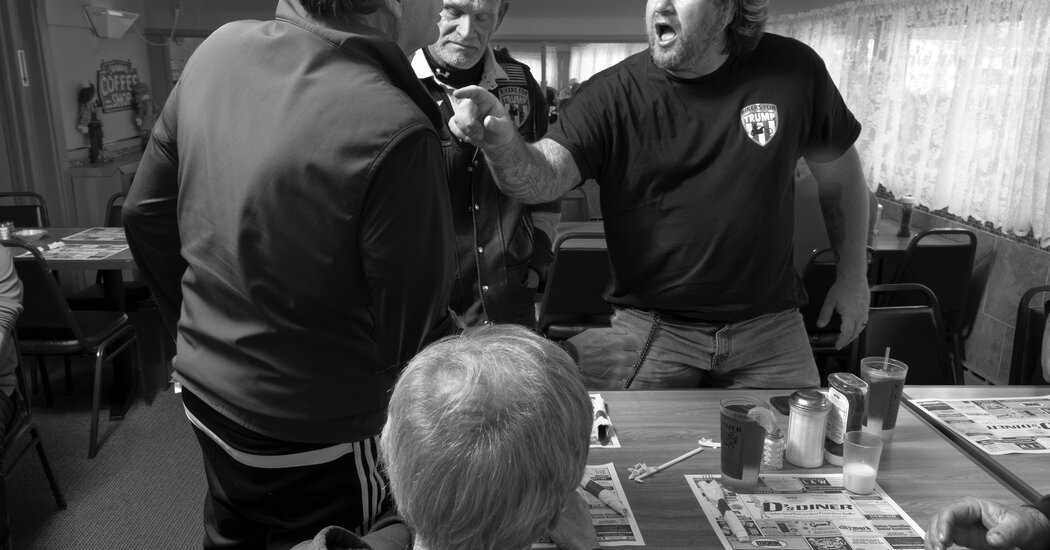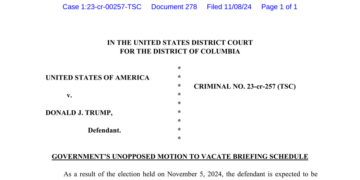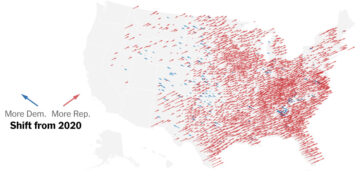The politics of the area have also shifted.
For two decades its voters reliably leaned Democratic, but Donald Trump won the county in 2016 and again four years later, both times by solid margins.
But Democrats hoped they could move the county back in their direction and made an intensive effort to do so.
County officials were vigilant leading up to Election Day. Luzerne County became a hotbed of election denialism in 2020, and Pennsylvania is an open-carry state. Some people feared voters might bring guns to the polls. Election workers were told they could bring their own guns.
The night before the election, a group of campaign volunteers organized by Jennifer Ziemba, the wife of the Luzerne County Republican Party chairman, gathered at Ziemba’s home in Harveys Lake, a prosperous community outside Wilkes-Barre.
They were calling Republican voters whose mail-in ballots had flaws like a missing date to tell them they had to cast provisional ballots in person.
“We’re not really MAGA-looking,” one of the women said. But they were staunch Trump supporters.
“The women voting solely on abortion make me crazy,” Ziemba said. “I’d gladly give up my abortion rights and my daughter’s for my son not to have to go to war. We’ll have peace with Trump.”
On Election Day, most of the state’s counties shifted further to the right, tilting Pennsylvania and its 19 Electoral College votes to Trump by about 130,000 voters.
She was sitting in the front parlor of her Wilkes-Barre home, built by her great-great grandfather.
Wynn’s ancestors escaped slavery by fleeing to Pennsylvania before the Civil War.
A man they did not know, a retired financial planner named Kim Pace, approached their table. He began by saying that his wife did not think it was a good idea to talk to them. He had voted for Harris.
“Congratulations, guys,” he said. “I hope it all works out.” His tone suggested that he was doubtful.
Dave Ragan, a U.S. Army veteran who had arrived on his motorcycle, stood up to respond. “We changed the world!” he said. “I don’t have to worry about my stepdaughter having a boy in the locker room.”
“Let me tell you something,” Pace said. “That stuff is overblown.” He wished them well and left.
Away from the table, he said, “If Harris had won, there was going to be trouble.”
In the days after the election, political tensions lingered in the community.
On Thursday evening, John McDermott, a retired lieutenant colonel in the Army Reserve, sat at home with his wife, Lee Ann, drinking a vodka and tonic after a round of golf. McDermott voted for Hillary Clinton in 2016 and Trump in 2020.
This year, he voted for Harris. “I couldn’t bring myself to vote for him,” he said. “He’s a convicted felon. He believes in conspiracy theories.”
Lee Ann, a county council member, saw matters differently: She was one of the women making calls at Jennifer Ziemba’s house on the eve of the election. Now she was on her way to meet some of them at a restaurant to toast Trump’s win.
The mood was festive when McDermott arrived. “We’re getting Trumpy!” one of the women exclaimed, as they raised their cosmopolitans and glasses of wine.
Among the revelers was Shelley Meuser, the wife of Representative Dan Meuser, whose district includes a part of Luzerne County.
“We got our country back!” shouted Terry Eckert, who is a real estate agent.
Thirty miles down the road from Wilkes-Barre is Luzerne County’s other city, Hazleton. Its population of 30,000 is 63 percent Latino, an estimated 90 percent of whom are from the Dominican Republic.
There are at least six Catholic churches and many Pentecostal congregations in the community. One of them is the Iglesia Cristiana Agua de Vida Hazleton, where Elizabeth Torrez is the pastor.
Philip Montgomery for The New York Times
Philip Montgomery is a photographer whose work examines the fractured state of America. Michael Sokolove, a contributing writer for the magazine since 2002, has written extensively on Pennsylvania and its politics.
Videos by Tre Cassetta.
Read the full article here








